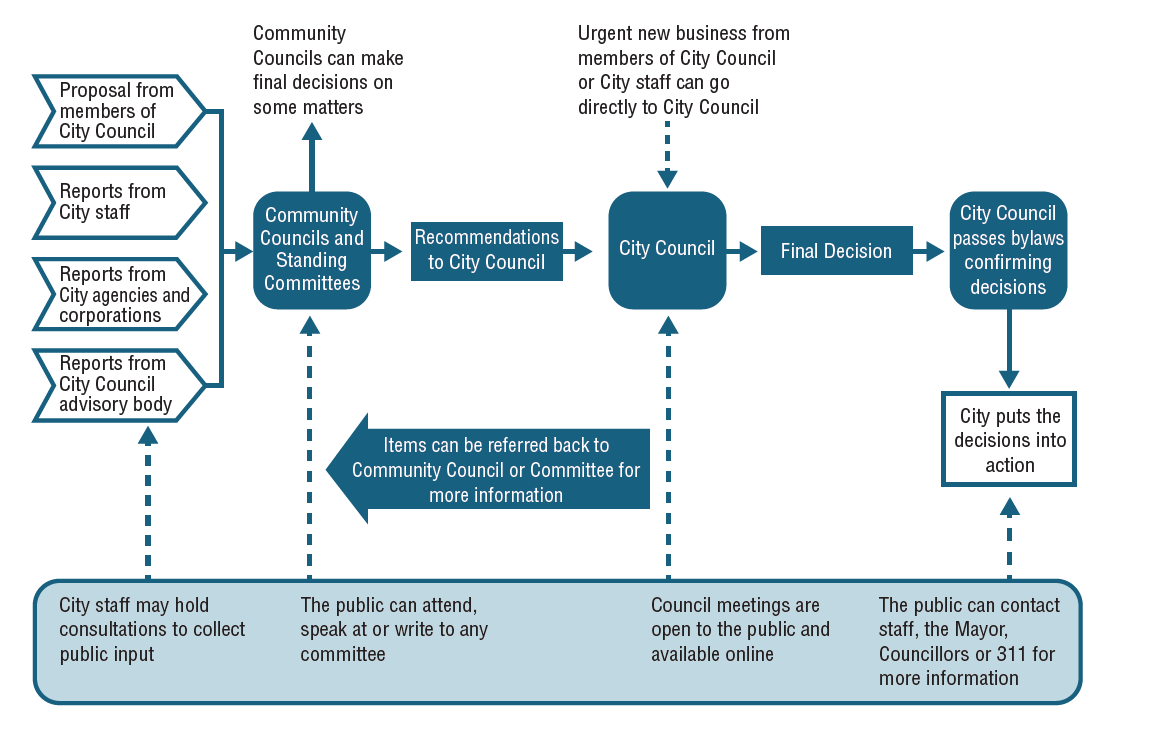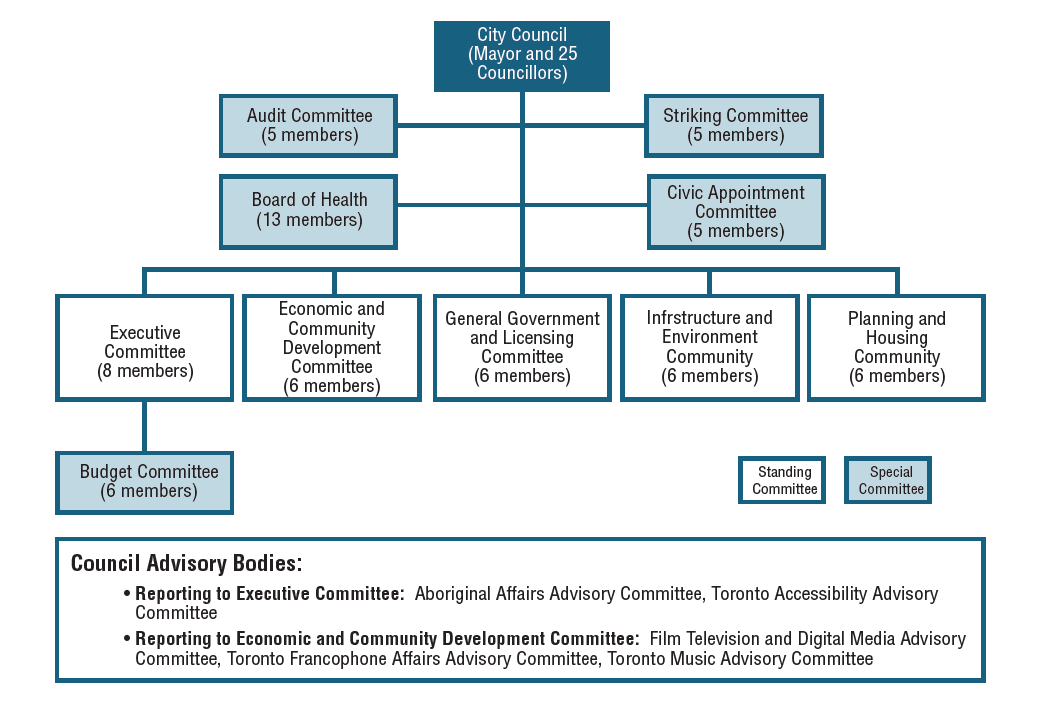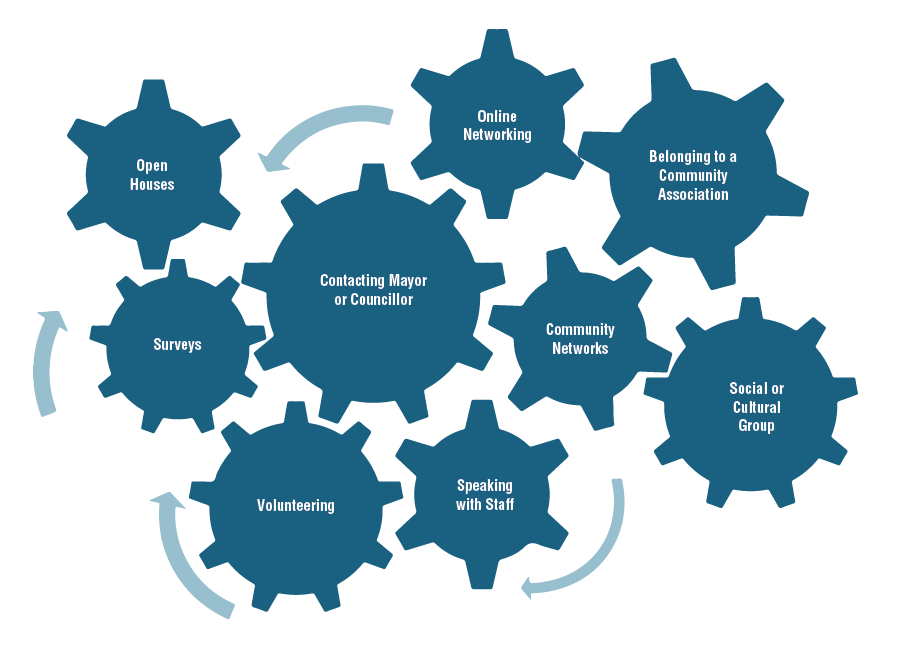Governance and Decision Making in Your City
City staff have undertaken consultations and engagements with the public and identified stakeholders exploring the impacts of a smaller City Council on the City’s governance, in keeping with the Work Plan and Engagement Strategy approved by the Special Committee on Governance at its meeting on April 12, 2019.
In recent months, the City has:
- Held meetings and surveyed the public to better understand the public’s perspective on the City’s decision-making structures and processes. Five public meetings were held across Toronto to provide the public the opportunity to discuss the impacts of a smaller Council on the City’s governance and a public survey was promoted for members of the public to share their thoughts with the City over nearly a two month period;
- Engaged City Councillors to better understand their perspectives on the impacts of the changes to Council on Council governance and their roles; and
- Reached out to neighbourhood associations (local, geographically focused groups such as neighbourhood coalitions, groups and partnerships, organizations that receive City grants to support community cohesion, ratepayer groups and resident associations) to hear their views on these recent changes to Council.
Additional input on the governance considerations of the impacts of a smaller City Council can be provided to staff by emailing engagement@toronto.ca.
To receive meeting and agenda information for the Special Committee please go to add link.
Summary of Input from Neighbourhood Associations to the Special Committee on Governance
The Special Committee on Governance, established by City Council to consider the impacts on the City’s governance structure and processes from the reduction in the size of Council, asked staff to consult with the city’s neighbourhood associations as part of its work.
Neighbourhood association members and coordinators were invited to:
- Complete a brief online survey with twelve questions that asked about their membership, their activities and their relationship with the City and its governance processes,
- Attend a one-on-one discussion with staff at the City’s the Civic Centres (3-7 pm at Scarborough Civic Centre on September 24, North York Civic Centre on September 25, City Hall on September 26, and Etobicoke Civic Centre on September 30), and
- Attend a workshop to discuss and share suggestions about the City’s governance processes and explore ideas for an “Office of Neighbourhoods” held from 6:30-8:30 pm at Metro Hall on October 1, 2019.
This report summarizes the feedback received from the consultations with neighbourhood associations. The total input from the consultation will be posted to the City’s Open Data website at www.toronto.ca/Open.
About the Special Committee on Governance
In December 2018, City Council created a Special Committee on Governance. The Committee will consider the impacts on the City’s governance structure and processes arising from the reduction in the size of Council and to make recommendations to City Council on any further changes to its governance structure.
- At the Committee’s first meeting on February 21, 2019, members asked staff to develop a public consultation plan.
- At the Committee’s second meeting on April 12, 2019, members endorsed a Work Plan and Engagement Strategy that includes several ways for residents to add their ideas for the Committee’s consideration.
- You can sign up online to receive meeting and agenda information for the Special Committee.
- You can sign up at the bottom of this web page to receive information about public engagement and consultation opportunities for the Special Committee on Governance or email engagement@toronto.ca..
What is Toronto's Governance System?
The City’s governance has many parts including:
- Structures such as standing committees, special committees, Community Councils and boards;
- Processes such as the schedule of meetings, how reports for Council are developed, and the procedural by-law which has all the rules for how Council and its committees work; and
- Roles such as the role of the Mayor, Councillors, the City Clerk, City staff and the public.
The image below describes the steps in City Council’s formal decision-making. It starts from an idea or a request, which is presented in a report to a Standing Committee or Community Council, proceeds to City Council for the final decision, and is then implemented by City staff. Council makes decisions by considering information from the public, staff and experts, and voting on recommendations from staff and Councillors. The public can participate in consultations, or by attending, speaking at or writing to a Council Committee or by contacting the Mayor, any Councillor, or staff.

Standing Committees
Standing Committees consider reports from City officials, make recommendations to Council on issues and priorities, and provide opportunities for debate and public participation to inform their decisions. All meetings are open to the public and residents can speak or submit written comments and contact the Mayor and Councillors at any time.
Council created five Standing Committees (See figure below) that are responsible for specific issues:
- Executive Committee – Council priorities, plans, international and intergovernmental relations, governance structures and processes, and the financial integrity of the City;
- Economic and Community Development Committee – Strengthening communities, neighbourhoods and the economy;
- General Government and Licensing Committee – Administrative operations of the City and the licensing of businesses;
- Infrastructure and Environment Committee – Toronto’s infrastructure needs and services, parks and forestry and the sustainable use of Toronto’s environment; and
- Planning and Housing Committee – Planning, property standards, growth and housing development.
Council also has Special Committees (such as the Budget Committee and the Special Committee on Governance) to consider specific matters, and Council Advisory Bodies (such as the Aboriginal Affairs Advisory Committee and Toronto Music Advisory Committee) to address Council priorities.

How does the public participate in the City's decision making?
Public Participation
The City engages the public across Toronto throughout the year. The public plays an essential role in the City’s decision-making by:
- Identifying issues for Council and staff consideration;
- Providing input and feedback on services, reports and policies;
- Partnering with the City to deliver programs; and
- Providing ideas and recommendations to committees, by voting, through local actions and advocacy and by participating in consultations, surveys and advisory bodies.
City-Led Engagement
City staff engage the public in a variety of ways. Some of these opportunities are one-time only, some are ongoing. Examples include:
- Public meetings and open houses to discuss new buildings, changes to roads and traffic, public transit expansion, City strategies, and other issues;
- Surveys on programs, issues and services;
- City-led community networks that bring the public, the City and other agencies together to discuss specific projects or longer-term issues;
- Conversations with City staff at community events and through the delivery of services at recreation centres, libraries, etc.;
- Appointing residents to City boards and Advisory Bodies to consider issues and make recommendations to Council and Committees;
- Volunteers to help with City events, outreach and programming; and
- 311 Toronto responses to resident questions and feedback.
Community-Led Engagement
Residents, neighbourhoods and community groups also create their own engagement with the City to share their ideas, concerns and suggestions to City staff, their Councillor or other groups. Examples include:
- Formal and informal groups and associations such as resident and ratepayer groups, business improvement areas, school-based groups, community-based organizations and faith groups;
- Online networks such as neighbourhood social media groups, web forums, and email lists; and
- Social and cultural groups such as sports leagues, recreational groups, community garden groups, parks groups, and arts groups.

Subscribe for e-Updates
Type (do not copy and paste) your email address into the box below and click “Subscribe” to receive updates on the series of public consultations being undertaken by the City for the Special Committee on Governance. You will receive email instructions to confirm your subscription.
